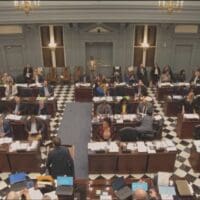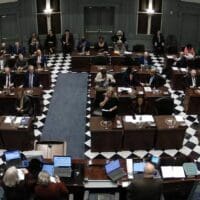
Delaware schools plan to help students with summer and other programs.
Droves of students will not be held back because of interruptions caused by the COVID-19 pandemic, Delaware educators say.
Instead, schools will bear down on core math and English skills. They’re also planning ways to help kids catch up through various programs in the summer and when they return to school in the fall.
“We’re trying our best to deliver on a valuable year of instruction for our kids, and to reach the kids that might be falling behind,” said Delaware Secretary of Education Susan Bunting. “We’re trying to get to them now, not wait until summer or next year.”
Ultimately, she said, educators believe it may take as long as four years to bring all the kids back to the level they should be at after their last two school years were disrupted with switches to virtual classes and then to a mix of in-person and virtual classes.
“I think every student will be impacted in some way by the last year,” said Robert Fulton, superintendent of Cape Henlopen School District. Some students will need more help than others, he said.
“We have to be thinking long,” said Colonial School District Superintendent Peter Leida, “and in some ways, the pandemic can help us rethink education. School wasn’t always working for every single kid anyway. So maybe we can make some adjustments, changes to some of the things we’re doing so that we’re not only going to catch the kids, we’re actually creating a better system for kids.”
One key to helping students succeed next year will be evaluating where they are now and deciding what kind of help they need.
The U.S. Department of Education has told Delaware it must participate in federal assessment testing, which was skipped last spring. But the state has options about how to do it. It can allow third to eighth grade students to complete the Smarter Balance test remotely, and it also may test as late as the start of the 2021-2022 school year in the fall.
Students could be back in classrooms full time by then.
Error, group does not exist! Check your syntax! (ID: 11)
Bunting sent the feds a letter Friday asking to be allowed to use the more flexible arrangements.
In the meantime, Bunting and school district superintendents say, each district continues to evaluate students with routine in-house assessments to add a deeper dimension to understanding a child’s grasp of school work rather than simply relying on grades or a teacher’s opinion.
“We have to be diligent about finding out where that child is,” Bunting said. “And then what can we do to fill in. We call it unfinished learning.”
The system needs the data, Leidl said, but he’s sorry schools will have to give up two weeks of classes to get it.
That information will be critical as districts plan summer programs, which have federal CARES Act money designated to pay for them, as well as other funding. Colonial School District has surveyed parents about what they’d like to see, and Cape Henlopen is surveying teachers to see who will be willing to work this summer, but neither has decided on programming.
Some of the extra help for kids could come in the new school year with afterschool programs and Saturday academies for elementary school grades, educators say.
Those programs likely will include basic course material, but also enrichment activities such as music, art and robotics that use classroom knowledge but are also fun, encourage creativity and help teach critical thinking.
“There’s a sense of urgency here,” said Candice Buchanan, president of the Summer Learning Collaborative in Wilmington. It helps plan summer programs for Hilltop and Kingwood community centers. “But if we focus too heavily on the wrong thing like test scores, we’re not going to be in a position to set our kids up for success.”
Error, group does not exist! Check your syntax! (ID: 11)
Holding kids back
As the pandemic closed school doors, some students struggled with virtual formats while others soared. Some weren’t able to be in all their classes because they had three people in the household trying to use the internet or a single device to share for school, Bunting said.
As stories circulated about schools having nearly half of students not showing up for online classes, the state and Delaware Department of Education poured millions of federal CARES dollars into providing internet service and devices to help kids get online.
They also poured money into positions for experts who could help.
“Remember that we have a full staff working right now,” Bunting said. ”So people who are reading interventionists or reading specialists or math coaches for students or special needs, psychiatrists or social workers, the full array of our staff members are working. So there’s a lot of effort, even though we had some students who are not as diligent.”
Not every child’s needs have been met, she acknowledged, but no one wants to hold a large number of students back.
There is a lot of evidence that it not only doesn’t really work, but also creates a lot of other problems, educators say..
It’s possible more students will be held back than normal, said Robert Fulton, superintendent of the Cape Henlopen School District. But not huge numbers.
“In general terms, I’m not in favor of retention as a way to improve student performance,” he said. “I think It’s better to gauge areas of weakness and put together specific plans for students to improve in those areas … I’d rather think about it as supports for students based on where they are.”
The issue is different for kindergarten through eighth grade students than it is for high schoolers. High schoolers must pass a certain number of units to graduate. Districts can offer the units at other times to keep those kids on track, educators said.
Error, group does not exist! Check your syntax! (ID: 11)
Summer programs
One reason educators are focusing on summer activities is that they feel students have support now and are too stressed after a day of Zoom classes to tackle additional assignments and classes.
At the same time, Bunting said, “We want to make sure that the essence of third grade is in place before that child moves on. We want to prevent his floundering at fourth grade levels, so the support piece is critical and that’s going to be a little bit different for every student.”
Decisions about how to do that will be made by districts and in some cases individual schools, Bunting said.
At Colonial, where 40 percent of students were in-person and 60% remote, more than half the parents said they wanted in-person programs this summer. About a quarter said remote only and about a quarter said hybrid or any of the above. Many asked specifically for academic support.
Whatever the plan is, it’s not going to fix everything, Leidl said.
“This is a long haul,” he said. “We’re not going to fix this over the summer. It’s going to take a concerted effort all day during the school day and then in any extended or enrichment classes, either afterschool programs or summer programs that we’re able to offer over the next several years.”
At Cape Henlopen, administrators are trying to decide what is needed and what they can offer.
About 70% of its kindergarten to fifth grade students have been in class five days a week since September. The system also has tried to get its special needs students in four days a week, Fulton said. He’s proud of meeting 100% of parent requests for where their children were placed.
“Everything is on the table,” Fulton said. “We think that kids are going to need not just academic support but also support emotionally as they come back after being out of school for so long.”
That could range from summer classes, to extra classes in the fall, to one-on-one time with reading specialists and additional mentoring.
“There are probably other things we haven’t thought of yet that we’re going to have in our plan,” he said.
Error, group does not exist! Check your syntax! (ID: 11)
He wasn’t sure whether anything would be mandatory.
Summer programs will not be mandatory in Colonial.
“We kind of lived through that era,” Leida said. ‘It’s not the right thing for kids to demand it, and then enforcing that demand is even more problematic.”
SummerCollab’s Buchanan agrees.
“I don’t believe summer school is the answer in the traditional sense of summer school,” Buchanan said.
Programs need to combine core lessons with enrichment so that students come away with a love of learning and a level of self-confidence that they can work through their lessons and succeed, she said.
“We call it productive struggle,” she said. “It’s about having the competence to work your wayt through to get an answer. And if you get the wrong answer, not giving up or feeling defeated and trying again until you do get the right answer.”
Leida agrees.
“I think what we need to do is create programs that promote kids and engage kids so that they want to be there,” he said. “It’s critical that kids want to come back every day and stay engaged.”
Leida favors programs that have small group learning and math activities with art, music, sports or team building activities. He likes offering drama, design challenges and critical thinking projects such as robotics.
Buchanan doesn’t believe there will ever be a one-size or one-stop fits all approach that works for everybody.
“We know that those gaps exist and they’re going to continue to exist,” she said. “We’ve got to make sure that the kids continue to want to learn.”
Error, group does not exist! Check your syntax! (ID: 11)
One of the questions about any summer 2021 programs is whether they can be in person or must continue virtually.
That may depend on how quickly Delaware can vaccinate people and reach herd immunity. To do that, it needs more doses of vaccine, and the federal government controls how much each state gets.
“We’re very dependent upon the health situation for the community,” Bunting said.“So we’ve learned to be patient.”
Even if summer programs must be largely virtual, Buchanan says SummerCollab saw a lot of success with its programs through community centers among kids who had not been thriving before.
“A lot of times we have to force the kids to get through their literacy sessions so that they can get to the fun, but I think because we focus so heavily on the relationship building aspect of it first, it was like a reading buddies type of program,” she said. “And they really walked away learning a lot and thriving in that environment.”
Some of those students were on the verge of being held back, but after the summer program they were back where they needed to be to move on as classes started in the fall of 2020, Buchanan said.
In general, she said, those were kids who felt disconnected from the system in some way.
The conversation about student performance oftens gets tilted toward academic outcomes, she pointed out.
“I think that is something we need to take a step back from and put aside,” she said, “because we’re not going to see the academic gains and growth that we want to see if we’re not focusing on making sure that the kids have their basic needs met and have social and emotional capacities to get through these traumatizing unprecedented times that we’re going through, and I don’t think we can.”
Error, group does not exist! Check your syntax! (ID: 11)
The next school year
Three big issues dominate topics when educators talk about a new school year starting in the fall: finances, what’s happening with COVID-19 and what will happen with virtual learning.
Most people hope schools will be filled with children in classrooms and the pandemic will be over or limping its way into history.
With Delaware’s Opportunity Funding expected to expand, if the General Assembly passes it, there will be more money for schools with students from poor households and those who are English language learners.
But CARES Act money may go away, and that’s funding a lot of the support personnel right now.
“Once we work through COVID challenges, I definitely don’t expect us to be able to afford those positions, nor would we need the positions long term,” Fulton said. “Some additional supports will be needed through next year, but I think we can handle whatever supports we need beyond that.”
One thing educators are mulling is the place virtual learning will have in the future.
“Interestingly, we’re finding that some students are thriving.The hybrid models, even the ones that are totally remote, just speaks to their learning style,” Bunting said.“I personally think that that option is going to be the best option for some of our students.”
Beyond learning styles, allowing virtual classes could help students with health issues or injuries that keep them out of school for a while. It could also allow small schools to offer courses it can’t afford by having their students hooked into programs such as advanced placement classes offered by other schools.
“By the opportunity to virtually learn, we have more advantages than we ever dreamed of for some of our students,” Bunting said.
Error, group does not exist! Check your syntax! (ID: 11)
Fulton said Cape Henlopen is looking at how the year of remote learning affects the way administrators, teachers, parents and students feel about virtual classes.
“Over the years we’ve focused on technology and using technology as an instructional tool,” he said. “Obviously this year has forced us to really take some leaps and improve in that area.”
He thinks being able to offer virtual classes has given the staff and students more flexibility that will stay useful.
“Whether or not it’s a long term solution for students in our district, we haven’t gotten that far,” Fulton said. “I’m sure there are some students who would do well with remote learning.”
He is concerned about what a lack of socialization and detachment from the classroom would do to the emotional well-being of students who stayed on remote learning.
“For some it may work,” he said, “and I guess we’ll definitely be discussing a lot more about it.”
Fulton said the system hasn’t been able to analyze who did well in virtual learning and who did not, but it will.
Offering virtual programs was on Colonial’s radar before the pandemic,especially for high schools, Leida said.
The system often starts to see kids who have been successful in elementary and middle school struggle in high school, he said. At the same time, many kids in high school begin to realize they are learners.
Either of those groups could soar with more virtual classes.
“Almost every week we’ve had some level of conversation around the need for a Virtual Academy for the future,” he said.
While more Colonial parents are asking for their kids to return to in-person classes, no one can foresee how that will affect the 2021-2022 school year, he said.
Planning for the future will also have to include families who for whatever reason don’t want their kids in classrooms because of fear of illness, he said.
“Because of the pandemic, you have to rethink your priorities,” Leida said. “All things start to be back on the table again, and then you re-evaluate where you are and how you’re going to have to allocate your resources.”


Betsy Price is a Wilmington freelance writer who has 40 years of experience.
Share this Post







